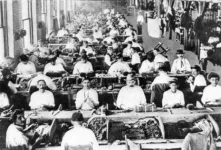In a recent interview Google co-founders Larry Page and Sergey Brin said that perhaps it’s time to re-think the traditional 40 hour work week mentality.
According to Larry Page, “If you really think about the things that you need to make yourself happy—housing, security, opportunities for your kids—anthropologists have been identifying these things. It’s not that hard for us to provide those things,” he said. “The amount of resources we need to do that, the amount of work that actually needs to go into that is pretty small. I’m guessing less than 1% at the moment. So the idea that everyone needs to work frantically to meet people’s needs is just not true.”
The statements made have drawn a lot of attention (and a fair amount of skepticism) from the general tech press. Some people have said that this is not a new idea (which it isn’t) but Page and Brin never claimed it was. Other’s have said that the two Googlers are living in a dream world and have no concept of what it’s like to be a worker in the real world. That a reduced work week is a luxury that only multi-billionaires can afford.
In a Forbes post Tim Worstall pointed out that working hours have been reducing for near two centuries now and it’s extremely likely that this is going to continue. In fact people actually have been working fewer and fewer hours if you also count time spent managing a household (unpaid labor). He attributes the drop in total hours worked per week to the rise in domestic technologies (takeout food, refrigerators, vacuum cleaners and microwave ovens to name a few). He quotes economist JM Keynes’s essay Economic Possibilities for our Grandchildren quite a bit and estimates that it took 65 hours a week of labor to run a household in the 1930s and now all that can be done in 5 hours.
It’s an interesting proposition. Consider that two hundred years ago, when we lived in a primarily agrarian society the average farmer (and his or her entire family) spent nearly every waking hour of their lives working just to stay alive. So yes, we spend much less time working and much more time indulging in leisure activities. Later when the industrial revolution took hold, rather than reducing the number of hours worked, people were able to work shifts around the clock. Productivity increased but that just allowed companies to make more stuff, not reduce the hours worked.
I enjoy watching the show ‘How it’s Made’ but it makes me uneasy sometimes when they tour a factory and show old black and white photos of hundreds of workers and then the current managers proudly boast ‘we used to employ five hundred workers here, but now, with automation this entire factory can be run by three people and we have increased production by 600 percent.’ I always wonder, what happened to those other 497 workers. Are they enjoying a happy retirement or were they simply laid off?
These days with combines and automated machinery one farmer can manage thousands of acres, but the net result wasn’t a reduced work week for farmers, it just meant there were fewer farmers.
Technology has allowed us to be more productive and spend less time beating clothes against rocks or churning our own butter, but it also meant employing fewer people and reducing the number of skilled jobs. It also ended up creating a society where a master’s degree won’t even guarantee a job at Taco Bell.








